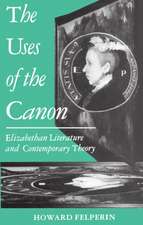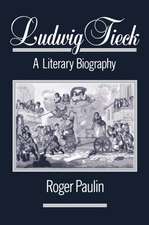Visionary Spenser and the Poetics of Early Modern Platonism
Autor Kenneth Borrisen Limba Engleză Hardback – 10 aug 2017
Preț: 523.10 lei
Preț vechi: 748.74 lei
-30% Nou
Puncte Express: 785
Preț estimativ în valută:
100.13€ • 108.80$ • 84.16£
100.13€ • 108.80$ • 84.16£
Carte tipărită la comandă
Livrare economică 10-16 aprilie
Preluare comenzi: 021 569.72.76
Specificații
ISBN-13: 9780198807070
ISBN-10: 0198807074
Pagini: 268
Ilustrații: 8 illustrations
Dimensiuni: 168 x 241 x 22 mm
Greutate: 0.56 kg
Editura: OUP OXFORD
Colecția OUP Oxford
Locul publicării:Oxford, United Kingdom
ISBN-10: 0198807074
Pagini: 268
Ilustrații: 8 illustrations
Dimensiuni: 168 x 241 x 22 mm
Greutate: 0.56 kg
Editura: OUP OXFORD
Colecția OUP Oxford
Locul publicării:Oxford, United Kingdom
Recenzii
This is an indispensable text for the understanding of literary Platonism and Spenser's place in that tradition.
[The book] will make anybody who reads it a more intelligent reader of Spenser's poetry as well. And so I hope that everybody does.
This book will remain of interest to scholars seeking greater understanding of the depth of Spenser's engagement with Platonism and, crucially, how Plato continued to shape the poet's artistry throughout his literary career.
will be of general interest to scholars of early modern literature and culture because of its wide-ranging claims for Plato's influence in the period ... Undoubtedly Borris's book will have a significant impact on readers of Spenser for some time to come, and the implications of his way of reading Plato back into the early modern period are likely to be influential as well.
All in all, Visionary Spenser is a learned book on a fascinating topic...Summing Up: Recommended. Graduate students, researchers, faculty.
[The book] will make anybody who reads it a more intelligent reader of Spenser's poetry as well. And so I hope that everybody does.
This book will remain of interest to scholars seeking greater understanding of the depth of Spenser's engagement with Platonism and, crucially, how Plato continued to shape the poet's artistry throughout his literary career.
will be of general interest to scholars of early modern literature and culture because of its wide-ranging claims for Plato's influence in the period ... Undoubtedly Borris's book will have a significant impact on readers of Spenser for some time to come, and the implications of his way of reading Plato back into the early modern period are likely to be influential as well.
All in all, Visionary Spenser is a learned book on a fascinating topic...Summing Up: Recommended. Graduate students, researchers, faculty.
Notă biografică
Kenneth Borris is Professor of English Literature at McGill University. A former Canada Research Fellow and winner of the MacCaffrey Award, he is the author of two monographs, Allegory and Epic in English Renaissance Literature, and Spenser's Poetics of Prophecy. He has also edited Same-Sex Desire in the English Renaissance: A Sourcebook of Texts, 1470-1650, and co-edited The Sciences of Homosexuality in Early Modern Europe (with George Rousseau) and The Affectionate Shepherd: Celebrating Richard Barnfield (with George Klawitter). His essays and chapters have appeared in numerous serials and collections including Renaissance Quarterly, The Oxford Handbook of Edmund Spenser, Milton Studies, Spenser Studies, and The Ashgate Research Companion to the Sidneys.















